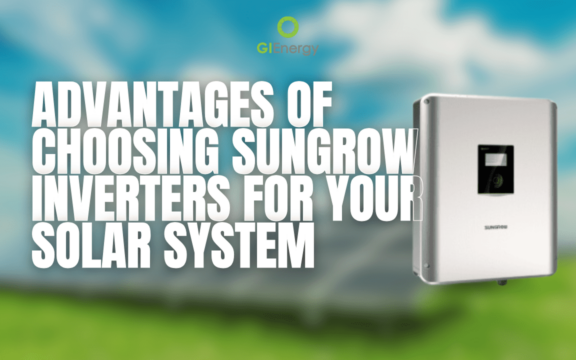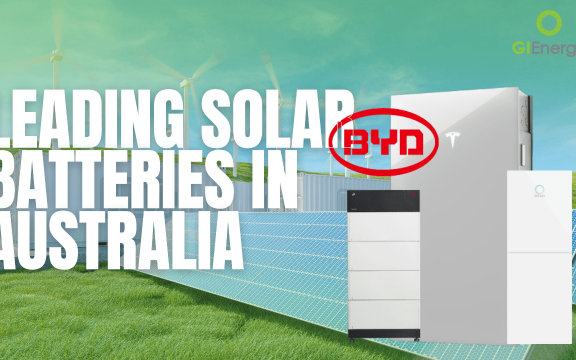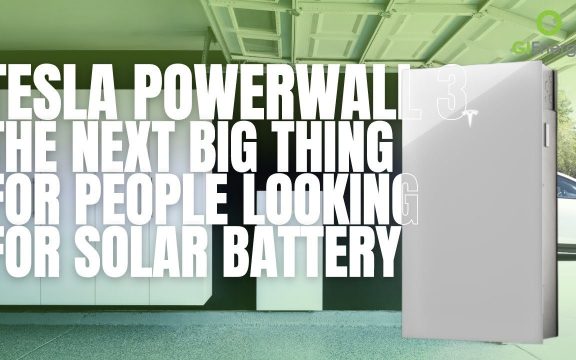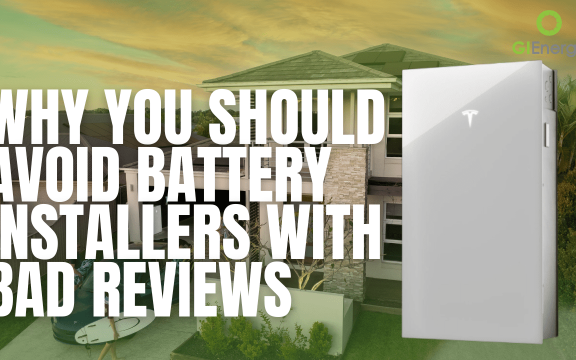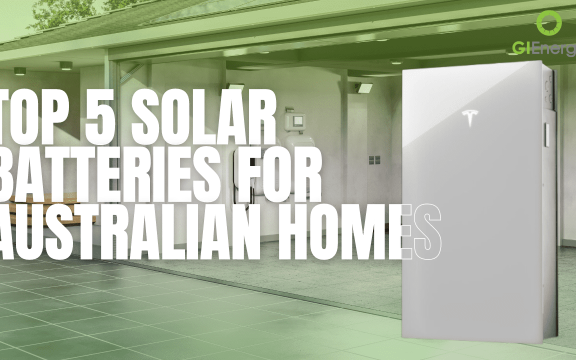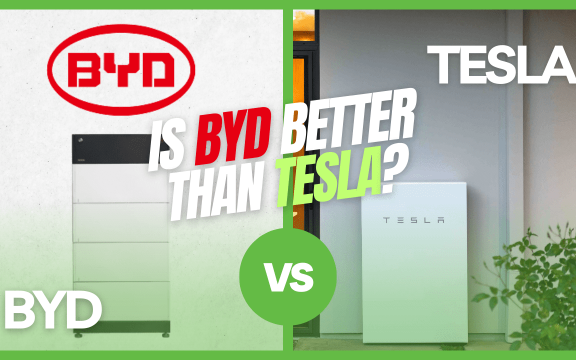Sungrow vs BYD: Which Home Battery Should You Choose?
Quick Answer:
Both Sungrow and BYD are excellent home batteries, but in most Australian households, Sungrow edges ahead for support, price per kWh, flexibility, and instant backup capability. BYD remains a strong contender, particularly for those already invested in Fronius systems, but Sungrow’s all-in-one ecosystem and reliability make it our top recommendation.
Why This Comparison Matters
If you’re an Australian homeowner weighing up Sungrow vs BYD for solar storage, you’re not alone. Both brands are global heavyweights, Clean Energy Council–approved, and trusted by thousands of households.
At GI Energy, we’ve installed both across Australia. And if we had to choose one for our own homes today, it would be Sungrow’s battery. Let’s break down why, step by step.
 Company Background & Support
Company Background & Support
-
Sungrow: The world’s largest inverter manufacturer, with over a decade of trusted use in Australia. Their after-sales support is widely regarded as the best in the industry. Our team has seen Sungrow resolve warranty claims faster than almost anyone else.
-
BYD: Best known as the world’s largest EV maker, BYD also produces reliable home batteries. However, its Australian support is looked after by Fronius at the moment and with BYD bringing its own inverter and new battery to the market coupled with the fact Fronius now have their own battery too, means we don’t really know how that support will be handled in the future.
Winner: Sungrow – because long warranties only matter if the company’s support is responsive.
Price Point & Value
Neither brand is “budget”—these are premium, future-proof batteries. But there are differences in value:
-
Sungrow: Offers more storage capacity per dollar, especially with scalable single-stack options. Their hybrid inverter is also cheaper than the equivalent Fronius option.
-
BYD: Competitive, but you may need extra balance-of-system hardware (combiners, connectors) once you max out capacity.
Price & Value Comparison
| Feature | Sungrow SBH/SBR | BYD Battery Box HV/VM |
|---|---|---|
| Approx. Price per kWh | Lower (more scalable) | Slightly higher |
| Hybrid inverter pricing | Cheaper (Sungrow-only) | Higher (Fronius-linked) |
| Scalability | Up to 40 kWh in one stack | Typically <22 kWh before needing second stack |
Winner: Sungrow – better ROI for larger homes needing >15kWh.
Sungrow vs BYD: Design & Aesthetics
-
Sungrow SBH: Modern, compact, and sleek. Single-stack scalability means less space needed in your garage or outdoor area.
- Sungrow SBR: Slightly older looking module and not as nice to look at as the SBH. but still a fairly attractive battery.
-
BYD: Taller (up to 2.1m for 22 kWh), making placement trickier in some homes.
Draw – both look good, but Sungrow wins for compactness.

Backup Capability
-
Sungrow: Instant backup (close to UPS-like). Larger inverters (15–25 kW) support full-home backup, great for large homes and small commercial.
-
BYD: Backup is reliable, but with a 20–30 second delay—noticeable if you’re running sensitive appliances.
Winner: Sungrow – faster, smoother transition.
Installation Considerations
Both are DC-coupled, but:
-
Sungrow allows more flexible placement thanks to smaller stacks and higher storage per stack.
-
BYD often requires keeping battery within 5m of the inverter, making design more restrictive.
Winner: Sungrow – easier installs, especially for tight garages.
EV Charging & Integration
-
Sungrow: Offers its own 7kW EV charger, integrated into the Sungrow monitoring app. One ecosystem = simpler experience.
-
BYD + Fronius: Works well, but requires multiple apps for inverter, charger, and battery.
Winner: Sungrow – a seamless “one brand” experience.

Safety & Warranty
Both batteries use safe lithium iron phosphate (LFP) chemistry. Both are certified, tested, and proven in the field.
-
Warranty: Sungrow’s single-manufacturer setup (inverter + battery + charger) means faster resolutions.
-
BYD: Excellent reliability, but warranty processing can be slower due to multiple parties.
Winner: Sungrow – minor edge for peace of mind.
The Best Choice based on Required Capacities
| CAPACITY REQUIREMENT | SUITABLE SINGLE-STACK MODEL | ||
| BYD BATTERY-BOX |
SUNGROW SBR | SUNGROW SBH |
|
| 6kWh | 8.3 kWh | 6.4 kWh | – |
| 7kWh | 8.3 kWh | 9.6 kWh | – |
| 8kWh | 8.3 kWh | 9.6 kWh | – |
| 9kWh | 11 kWh | 9.6 kWh | – |
| 10kWh | 11 kWh | 9.6 kWh | – |
| 11kWh | 11 kWh | 12.8 kWh | – |
| 12kWh | 13.8 kWh | 12.8 kWh | – |
| 13kWh | 13.8 kWh | 12.8 kWh | – |
| 14kWh | 13.8 kWh | 12.8 kWh | – |
| 15kWh | 16.6 kWh | 12.8 kWh | – |
| 16kWh | 16.6 kWh | 16 kWh | – |
| 17kWh | 16.6 kWh | 16 kWh | – |
| 18kWh | 19.3 kWh | 16 kWh | – |
| 19kWh | 19.3 kWh | 19.2 kWh | – |
| 20kWh | 22.1 kWh | 19.2 kWh | 20 kWh |
| 21kWh | 22.1 kWh | 19.2 kWh | 20 kWh |
| 22kWh | 22.1 kWh | 22.4 kWh | 20 kWh |
| 23kWh | – | 22.4 kWh | 20 kWh |
| 24kWh | – | 22.4 kWh | 20 kWh |
| 25kWh | – | 25.6 kWh | 25 kWh |
| 30kWh | – | – | 30 kWh |
| 35kWh | – | – | 35 kWh |
| 40kWh | – | – | 40 kWh |
Sungrow vs BYD: Which Should You Choose?
-
If you want best support, faster backup, better value per kWh, and seamless ecosystem integration → Sungrow SBH is your battery.
-
If you’re already running Fronius solar inverters and prefer BYD’s design, it’s still a strong choice.
FAQs: Sungrow vs BYD
1. Is Sungrow better than BYD for Australian homes?
Yes—Sungrow generally wins for support, scalability, and backup speed.
2. Which battery has the longer lifespan?
Both use LFP chemistry, offering 10+ years of reliable service.
3. Can either battery power my whole house in a blackout?
Yes, but Sungrow’s larger inverters (15–25 kW) make full-home backup easier.
4. Which is more cost-effective per kWh?
Sungrow provides more storage in a single stack, lowering cost per kWh.
5. Do Sungrow or BYD support EV chargers?
Yes, both do—but Sungrow’s charger integrates directly into its app.
6. Are both eligible for Australian solar rebates?
Yes, both are CEC-approved and eligible for rebates such as Cheaper Home Battery Program.
Key Takeaways
-
Support matters most: Sungrow is unmatched in after-sales care.
-
Price per kWh: Sungrow is more scalable and cost-efficient.
-
Backup: Sungrow is nearly instant, BYD has a delay.
-
Both safe, reliable, and premium – but if choosing today, we’d go Sungrow.
You may also like: Sungrow SBH Battery Review | Best Solar Battery in 2025
About GI Energy
GI Energy is an award-winning Australian solar and battery installation company with over a decade of experience. Known for ethical practices, high-performance systems, and exceptional after-install support, GI Energy is trusted by homeowners, councils, schools, and major businesses nationwide.
Written by Daniel McCabe, founder and strategist at GI Energy. With over 16 years in the energy industry — from procurement to solar and holistic energy management — Daniel is focused on helping Australians take a balanced, long-term approach to their energy needs. His insights combine real-world experience with a strong belief in intelligent, ongoing support — not just one-off solar installs.











